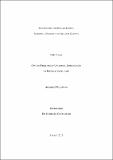| dc.contributor.advisor | Cavanaugh, Kathleen | |
| dc.contributor.author | O'Sullivan, Aisling | |
| dc.date.accessioned | 2014-04-07T13:23:52Z | |
| dc.date.issued | 2013-08-30 | |
| dc.identifier.uri | http://hdl.handle.net/10379/4267 | |
| dc.description.abstract | The debate which envelopes the principle of universal jurisdiction draws out a "dark side" of the international criminal law project because the commitment by the international community to individual criminal accountability as "universal" has not produced its corollary the court of humanity that will never adjourn. As a principle, universal jurisdiction is considered as an essential complementary mechanism for accountability. At the same time, there is a significant emphasis on avoiding the principle's 'manipulation for political ends'. Therefore, the debate on universal jurisdiction swings between the competing projects of preventing impunity and of avoiding abuse. Disrupting the notion of international law as located within a fixed political culture underpins the approach this thesis adopts when examining the struggle between these competing projects within the contemporary debate. Using Martti Koskenniemi's work as a framework, this thesis draws out, from within the legal judgments, the linguistic indeterminacy of the opposing legal arguments and the institutional biases that underpin the legal outcomes.
From this approach, this thesis argues that the legal debate on universal jurisdiction is best read as a movement of hegemonic and counter-hegemonic positions wherein these competing projects, characterized as moralist and formalist approaches, struggle for hegemony. It illustrates how this struggle is rooted in the competing portrayals of universal jurisdiction in the Eichmann case, which were drawn from opposing debates on the principle since the end of the 19th century. It demonstrates how the dominance of institutional biases of the regimes of international criminal law and public international law explain this hegemonic movement from a moralist approach's hegemonic control in the 1990s, with its bias towards preventing impunity, to a formalist approach's hegemony after the Arrest Warrant case, with its bias towards international stability. It observes that the formalist approach's hegemony has been maintained, albeit with moralist leanings. | en_US |
| dc.rights | Attribution-NonCommercial-NoDerivs 3.0 Ireland | |
| dc.rights.uri | https://creativecommons.org/licenses/by-nc-nd/3.0/ie/ | |
| dc.subject | Universal jurisdiction | en_US |
| dc.subject | International criminal law | en_US |
| dc.subject | Critical approaches to international law | en_US |
| dc.subject | Law | en_US |
| dc.title | On the Principle of Universal Jurisdiction in International Law | en_US |
| dc.type | Thesis | en_US |
| dc.contributor.funder | NUI Galway Doctoral Fellowship | en_US |
| dc.local.note | Against the backdrop of Martti Koskenniemni's writings, this thesis unpacks the debate on the principle of universal jurisdiction since the 1990s. It argues that these debates move between hegemonic and counter-hegemonic positions, each of which represents competing views of international law, that is, "preventing impunity" or "avoiding abuse of jurisdiction". | en_US |
| dc.description.embargo | 2017-12-09 | |
| dc.local.final | Yes | en_US |
| nui.item.downloads | 5617 | |


